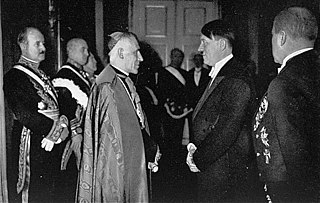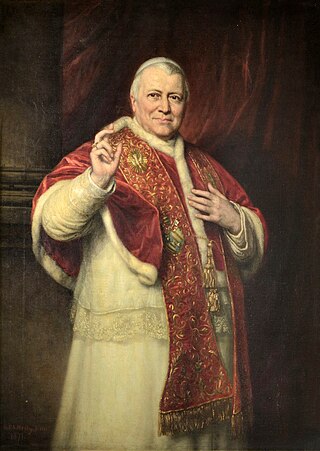Notes
- ↑ Hubert Wolf, Kenneth Kronenberg, Pope and Devil: The Vatican's Archives and the Third Reich (2010) p 283
The syllabus against racism is a Vatican document written in 1938, designed to promote the condemnation of racism and Nazi ideology in Catholic educational institutions.
In April 1938, the Sacred Congregation for seminaries and universities developed at the request of Pius XI a syllabus condemning racist theories to be sent to Catholic schools worldwide. [1]

Ultramontanism is a clerical political conception within the Catholic Church that places strong emphasis on the prerogatives and powers of the Pope. It contrasts with Gallicanism, the belief that popular civil authority—often represented by the monarch's or state's authority—over the Church is comparable to that of the Pope.
Dignitatis humanae is the Second Vatican Council's Declaration on Religious Freedom. In the context of the council's stated intention "to develop the doctrine of recent popes on the inviolable rights of the human person and the constitutional order of society", Dignitatis humanae spells out the church's support for the protection of religious liberty. It set the ground rules by which the church would relate to secular states.

Pope Pius XI, born Ambrogio Damiano Achille Ratti, was the Bishop of Rome and head of the Catholic Church from 6 February 1922 to 10 February 1939. He also became the first sovereign of the Vatican City State upon its creation as an independent state on 11 February 1929. He remained pope until his death in February 1939.

In politics, integralism, integrationism or integrism is an interpretation of Catholic social teaching that argues the principle that the Catholic faith should be the basis of public law and public policy within civil society, wherever the preponderance of Catholics within that society makes this possible. Integralism is anti-pluralist, seeking the Catholic faith to be dominant in civil and religious matters. Integralists uphold the 1864 definition of Pope Pius IX in Quanta cura that the religious neutrality of the civil power cannot be embraced as an ideal situation and the doctrine of Leo XIII in Immortale Dei on the religious obligations of states. In December 1965, the Second Vatican Council approved and Pope Paul VI promulgated the document Dignitatis humanae–the Council's "Declaration on Religious Freedom"–which states that it "leaves untouched traditional Catholic doctrine on the moral duty of men and societies toward the true religion and toward the one Church of Christ". However, they have simultaneously declared "that the human person has a right to religious freedom," a move that some traditionalist Catholics such as Archbishop Marcel Lefebvre, the founder of the Society of St. Pius X, have argued is at odds with previous doctrinal pronouncements.

The Syllabus of Errors is the name given to an index document issued by the Holy See under Pope Pius IX on 8 December 1864 at the same time as his encyclical letter Quanta cura. It collected a total of 80 propositions that the Pope considered to be current errors or heresies, pairing the briefest headings with references to the various documents where the actual teachings are found.

TheCatholic Encyclopedia: An International Work of Reference on the Constitution, Doctrine, Discipline, and History of the Catholic Church, also referred to as the Old Catholic Encyclopedia and the Original Catholic Encyclopedia, is an English-language encyclopedia about Catholicism published in the United States. It was designed "to give its readers full and authoritative information on the entire cycle of Catholic interests, action and doctrine".

Mit brennender Sorge is an encyclical of Pope Pius XI, issued during the Nazi era on 10 March 1937. Written in German, not the usual Latin, it was smuggled into Germany for fear of censorship and was read from the pulpits of all German Catholic churches on one of the Church's busiest Sundays, Palm Sunday.
Pope John Paul II was criticised for, amongst other things, an alleged lack of response to child sex abuse in the Catholic Church.

Alois Karl Hudal was an Austrian bishop of the Catholic Church, based in Rome. For thirty years, he was the head of the Austrian-German congregation of Santa Maria dell'Anima in Rome and, until 1937, an influential representative of the Catholic Church in Austria.

La Civiltà Cattolica is a periodical published by the Jesuits in Rome, Italy. It has been published continuously since 1850 and is among the oldest of Catholic Italian periodicals. All of the journal's articles are the collective responsibility of the entire "college" of the magazine's writers even if published under a single author's name. It is the only one to be directly revised by the Secretariat of State of the Holy See and to receive its approval before being published.
Lamentabili sane exitu is a 1907 syllabus, prepared by the Roman Inquisition and confirmed by Pope Pius X, which condemns what it deems to be errors in the exegesis of Holy Scripture and in the history and interpretation of dogma.

The papacy of Pius XII began on 2 March 1939 and continued to 9 October 1958, covering the period of the Second World War and the Holocaust, during which millions of Jews were murdered by Adolf Hitler's Germany. Before becoming pope, Cardinal Pacelli served as a Vatican diplomat in Germany and as Vatican Secretary of State under Pius XI. His role during the Nazi period has been closely scrutinised and criticised. His supporters argue that Pius employed diplomacy to aid the victims of the Nazis during the war and, through directing his Church to provide discreet aid to Jews and others, saved hundreds of thousands of lives. Pius maintained links to the German Resistance, and shared intelligence with the Allies, but at the same time he developed alliances with Nazi Germany and Fascist Italy and even arranged secret negotiations with Hitler's envoys. His strongest public condemnation of genocide was, however, considered inadequate by the Allied Powers, while the Nazis viewed him as an Allied sympathizer who had dishonoured his policy of Vatican neutrality.
Pope Pius XII's 1942 Christmas address was a speech delivered by Pope Pius XII over Vatican Radio on Christmas 1942. It is notable for its denunciation of the extermination of people on the basis of race, and followed the commencement of the Nazi Final Solution program to exterminate the Jews of Europe. The significance of the denunciation is a matter of scholarly debate.

Vatican City pursued a policy of neutrality during World War II under the leadership of Pope Pius XII. Although the city of Rome was occupied by Germany from September 1943 and the Allies from June 1944, Vatican City itself was not occupied. The Vatican organised extensive humanitarian aid throughout the duration of the conflict.

Popes Pius XI (1922–1939) and Pius XII (1939–1958) led the Catholic Church during the rise and fall of Nazi Germany. Around a third of Germans were Catholic in the 1930s, most of them lived in Southern Germany; Protestants dominated the north. The Catholic Church in Germany opposed the Nazi Party, and in the 1933 elections, the proportion of Catholics who voted for the Nazi Party was lower than the national average. Nevertheless, the Catholic-aligned Centre Party voted for the Enabling Act of 1933, which gave Adolf Hitler additional domestic powers to suppress political opponents as Chancellor of Germany. President Paul Von Hindenburg continued to serve as Commander and Chief and he also continued to be responsible for the negotiation of international treaties until his death on 2 August 1934.

The theology of Pope Pius IX championed the pontiff's role as the highest teaching authority in the Church.
The modern history of the papacy is shaped by the two largest dispossessions of papal property in its history, stemming from the French Revolution and its spread to Europe, including Italy.
Syllabus most commonly refers to an outline and summary of topics to be covered in an education or training course.
The Dicastery for the Laity, Family and Life is a dicastery of the Roman Curia. Pope Francis announced its creation on 15 August 2016, effective 1 September 2016. It took over the functions and responsibilities of the Pontifical Council for the Laity and the Pontifical Council for the Family. It has responsibility "for the promotion of the life and apostolate of the lay faithful, for the pastoral care of the family and its mission according to God's plan and for the protection and support of human life."

The Catholic Church and race refers to the teachings, practices and approaches of the Catholic Church in regard to the human races. The core teaching of the Catholic Church on human beings, is that all of the races of mankind are required to convert to the Catholic faith to attain eternal salvation. The foundational break between Christianity and Rabbinic Judaism on human beings is that since the Incarnation of Jesus Christ, the new covenant with the God, is based not on the concept of a tribal, hereditary definition of a chosen people by blood which excludes gentiles, but on faith and belief, accessible to all of the races of man.